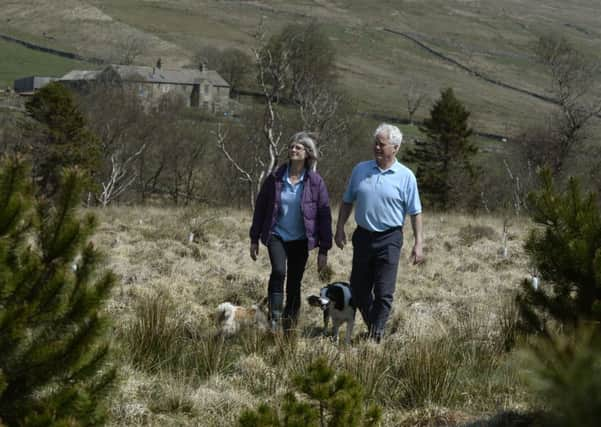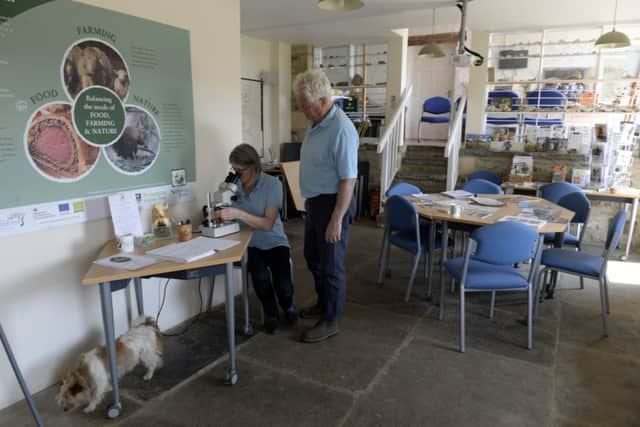Is this the most eco-friendly farm in Yorkshire?


With hundreds of acres of windswept, peaty moorland climbing to 1,600ft, Nethergill Farm might not have seemed the most attractive of business propositions. But when Chris and Fiona Clark came across the remote uplands at the head of the River Wharfe, they knew that they had finally discovered what they were looking for. Their three-year quest to find a farm of their own had already taken them to 45 locations in Scotland, Wales, Devon and Yorkshire but they were planning to do things differently – and Nethergill had the potential to let them do just that.
“We wanted an agricultural conservation project and this was a blank canvas,” says Chris. “The biggest asset that we have is the two of us, but the second is our location.”
Advertisement
Hide AdAdvertisement
Hide AdThe Clarks knew that they would never be able to compete directly with more productive lowland farms so they would have to keep their costs down. But what they did next was tear up the rule book and throw it away. Conventional wisdom dictated that the best way of compensating for the poor quality of their marginal land would be to run more sheep on it. Instead, they made the counterintuitive move of reducing numbers so that their animals could be left to forage all the year round. Today a herd of just 12 hardy but docile White Shorthorn cattle together with 60 ewes thrive on tough grass and rank vegetation even through the harsh winter months.


Farming less intensively has also brought environmental benefits by helping to preserve the vast carbon sink underneath the Pennine hills and cutting methane production. But the changes make sense economically too. There has been no need to buy in fodder and cereals and low stocking levels have resulted in fewer cases of lameness of sheep by reducing transmission of bacterial infections. Even the nutritional quality of the meat has been enhanced. Research has shown that pasture-fed beef and lamb have a higher ratio of unsaturated to saturated fats than conventionally farmed alternatives and contain more omega-3 oils than salmon.
“We suddenly realised that the less stock we had, the more money we made,” says Chris. “But we have never believed that there is a conflict between farming, conservation and sustainability. If we did not make a profit, we could not stay here.”
That’s a message the Clarks are keen to pass on and in August 2015 their efforts were recognised when they received Green Tourism’s Gold Award. The old shippon that used to house cows over the winter has been converted into a field centre complete with microscope, telescopes, binoculars, identification guides, and an impressive collection of animal skulls. Passing Dales Way walkers leave cash in an honesty box in return for shelter, tea, coffee and home-made flapjack. Two stone hay lofts have been converted into self-catering accommodation, bird hides have been constructed from recycled plastic bags and farm trails take in some of the 30,000 newly planted trees.
Advertisement
Hide AdAdvertisement
Hide AdNow black grouse are returning and other visitors include merlins, peregrine falcons, hen harriers, three species of owl, redstarts, crossbills, goosanders, herons, sandpipers and dippers. Rare breed farm animals are thriving too. Pure white Woodlander sheep from the Pendle area have recently been introduced to supplement the existing Dalesbred stock. Originally from the border area between Cumbria and Scotland, there are now only 160 breeding female White Shorthorn cattle in the world. And a colourful flock of free-range hens – albeit recently depleted by a stoat attack – struts around the farm buildings.


Work to restore the land to its natural state has included blocking peat grips from the fell tops. Back in the Sixties, these drainage channels were cut by dragging a plough down the fellside between two tractors stationed at the top and bottom. But significant erosion since 2008 meant that ditches that once reached knee level are now more than five feet deep. There has already been a marked reduction in water flow in the gills coming off the moors and the work should reduce the risk of flooding further down the dale. The planting of willow bundles along the banks of the beck will further slow run-off and provide habitats for wildlife.
Chris and Fiona are also working with the owners of nearby Greenfield Forest, one of only 17 red squirrel reserves in England. It would have been tempting to feed the biomass boiler that provides all of the farm’s heat and hot water with wood pellets but the Clarks reduce energy costs by taking delivery of over 40 tons of logs a year and laboriously cutting them down to size with a firewood processor in an outbuilding. Solar panels provide 75 per cent of their electricity and a hybrid car further reduces greenhouse gas emissions.
Self-catering guests have the option of buying home-made ready meals prepared using Nethergill Farm beef and mutton.
Advertisement
Hide AdAdvertisement
Hide Ad“We want people to leave here more knowledgeable about food, farming and the environment and how they link together than when they arrived,” says Chris. “They are inextricably connected but at no time have we had representatives of all three here who agree to the same things. We are both becoming braver about saying what we think and we would like to see protocols that encompass the whole landscape.”
Maybe that’s easier said than done. Experts disagree over what a truly natural environment should look like – and even as to whether the Clarks should encourage the growth of traditional hay meadow flowers outside the field centre or leave the peaty soil as it is.
But at least the couple who “were green from the age of 18” are now in a position to provoke debate. Back in the Seventies it seemed that their prospects had already been written off because neither was from a traditional farming background. Chris was born in Tanganyika – now Tanzania – to parents who originally came from a fishing village in Devon and Fiona’s family were from the Shadwell suburb of Leeds. They met in the first hour of their agricultural college course and were immediately told that students from outside the sector should not have aspirations of ever owning a farm.
“That was like a red rag to a bull for Chris,” says Fiona. They set their hearts on proving the lecturer wrong by the time they were 50 – and managed with months to spare.
Advertisement
Hide AdAdvertisement
Hide AdThe Clarks’ first jobs were on a game estate, which soon took on a herd of pigs. Chris was asked to manage it with Fiona as his assistant and they went on to set up their own farm on the Loseley Park Estate in Guildford, Surrey, which made yoghurts and ice cream. This meant borrowing large amounts of money at high interest rates – only for prices to plummet worldwide as their first batch of piglets were due to go to market.
But an exotic diet that included surplus chocolate mousse, lemon sorbet and double cream had done wonders for the flavour of the pork. While farming was rocked by the BSE crisis of the nineties, the Clarks had inadvertently blazed a trail by finishing their animals outside, taking bonemeal out of their feed and rearing them organically. After selling pigs to the Q Guild of butchers, working all hours while bringing up two children, Chris retrained in marketing and Fiona in graphic design – still with the ultimate goal of owning their own farm. They set up a new initiative providing promotional material and advice to meat retailers before diversifying into consultancy work with small and medium-sized companies and councils.
By 2005 they had saved up enough to invest in Nethergill Farm but it is still very much a work in progress. Future developments may include selling the range of ready meals online. Fiona is receiving an increasing number of commissions for her artwork, which draws inspiration from the farm’s wildlife and domestic animals, and a circular walk could be created by building two bridges over the beck.
“The perception is that we are not proper farmers and that may be true,” says Chris. “But we are very good business people.”
For more information visit nethergill.co.uk